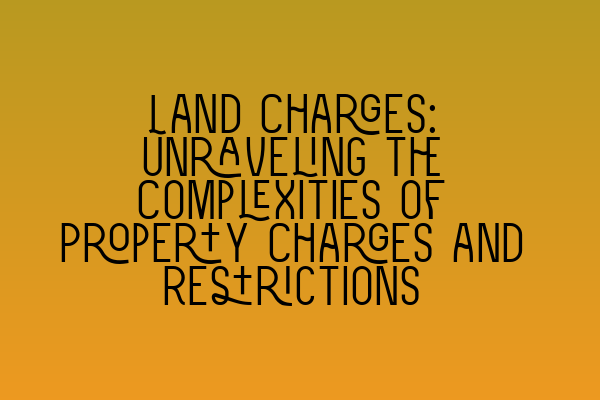Land Charges: Unraveling the Complexities of Property Charges and Restrictions
Welcome to the SQE Property Law & Land Law blog! Today, we will be delving into the intricate world of Land Charges, uncovering the complexities surrounding property charges and restrictions. Whether you are a first-time homebuyer, a property investor, or a legal professional seeking to expand your knowledge, this article aims to provide you with valuable insights into this crucial aspect of property law.
Before we dive deep into the topic, let’s start with a simple definition. Land Charges refer to any obligations, restrictions, or liabilities that can affect a property’s use, ownership, or value. They are registered against the title of the property and serve as a means to protect the legal rights and interests of various parties involved.
Understanding Land Charges is vital for several reasons. Firstly, as a prospective buyer, it is crucial to identify and assess any existing charges or restrictions on a property to ensure you make an informed decision. Secondly, as a property owner, being aware of any potential charges or liabilities allows you to protect your investment and take appropriate action if needed. Lastly, for legal professionals, having a comprehensive understanding of Land Charges is essential for providing accurate advice and effectively navigating property transactions.
The Types of Land Charges
Land Charges can take various forms, each with its own set of implications. Let’s explore some of the most common types:
1. Financial Charges:
Financial charges typically arise from mortgages, loans, or any other type of financing secured against a property. These charges grant the lender a legal interest in the property and provide them with the right to recover their money in case of default. It is essential to conduct a thorough investigation into any financial charges before purchasing a property to avoid potential surprises down the line.
2. Restrictive Covenants:
Restrictive covenants are often included in property deeds and impose certain limitations on how the property can be used or developed. They aim to protect the interests of the original developer or surrounding properties by maintaining specific conditions, such as prohibiting certain types of constructions or activities. It is crucial to carefully review any restrictive covenants to ensure compliance and avoid potential legal disputes.
3. Easements:
Easements refer to the rights granted to individuals or other properties to use a specific portion of land for a particular purpose. Common examples include rights of way, drainage rights, or utilities access. It is important to identify and understand any existing easements as they can significantly impact the property’s value and potential uses.
4. Equitable Charges:
Equitable charges, also known as equitable interests, are interests that do not appear on the official title but are recognized by equity. These charges may arise from agreements, trusts, or other arrangements that confer specific rights or obligations on parties involved. Unraveling equitable charges can be particularly complex, and seeking legal advice is crucial to ensure full understanding and protection of rights.
These are just a few examples of the many types of Land Charges that can exist. Each type comes with its own nuances, legal considerations, and potential impact on the property. Understanding these intricacies is key to making informed decisions and safeguarding your interests.
The Process of Discovering Land Charges
When purchasing a property, it is essential to conduct a comprehensive search to discover any existing Land Charges. The process typically involves engaging a professional search agent or solicitor to undertake the necessary investigations. The search usually includes:
Local Authority Search:
A local authority search is conducted with the relevant local council to uncover any planning permissions, building regulations, or restrictions that may affect the property. This search can unveil valuable information about ongoing or proposed developments in the vicinity.
Land Registry Search:
A Land Registry search is performed to obtain an official copy of the property’s title register, title plan, and any other relevant documents. This search reveals registered charges, restrictions, and ownership details, helping paint a comprehensive picture of the property’s legal status.
Seek Professional Advice to Navigate Land Charges
Given the complexities and potential pitfalls associated with Land Charges, seeking professional advice is highly recommended. A skilled property solicitor can guide you through the process, ensure due diligence, and provide vital insights to protect your interests.
If you require assistance with Land Charges or any other property law matters, SQE Property Law & Land Law is here to help. Our team of experienced solicitors specializes in property law and can provide expert advice tailored to your specific needs. Don’t hesitate to reach out to us to schedule a consultation.
Thank you for joining us on this journey through the intricate world of Land Charges. Remember to stay informed, seek professional advice, and make wise decisions when it comes to property transactions. For more insights on legal matters, visit our related articles:
- Understanding Contractual Capacity: Rights and Limitations
- Interactive SQE Mock Tests for Contract Law: Test Your Knowledge
- Join Our SQE Contract Law Webinars: Expert Insights and Guidance
- Contract Law Reforms: An Analysis of Recent Changes
- Parties in a Contract: Rights and Responsibilities
Stay tuned for more informative articles from SQE Property Law & Land Law. We aim to empower you with valuable knowledge to navigate the complexities of property law with confidence!
